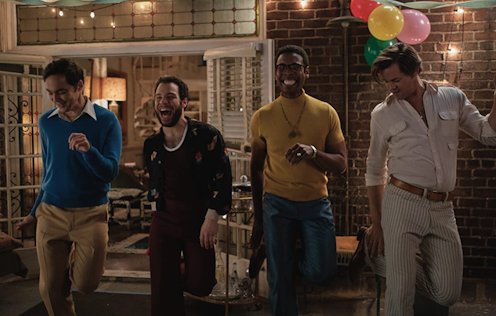A landmark document of 20th century American gay life, The Boys in the Band began life as a 1968 play by Mart Crowley; adapted into a well-received, now rarely screened film by William Friedkin in 1970, it was revived on Broadway two years ago to commemorate the play's fiftieth anniversary. That revival has in turn sparked a confident new filmed version, stacked with openly out talent and enthusiastically objectified eye candy, and produced by Ryan Murphy as part of his 2020 masterplan to swamp Netflix with new content. (Seriously: I know these are restless times, but does the guy ever sleep?) Viewed from here, Crowley's play seems more than ever a precursor to the rigidly hetero The Big Chill. We're invited to a birthday party at the rooftop apartment of fretful New Yorker Michael (Jim Parsons), where the guests will chat, flirt, bond, bicker and formation dance to Martha and the Vandellas' "Heatwave". Via a process not unlike chromatography, Crowley drew out a pretty full spectrum of gay experience as it was circa '68, ranging from the ever-flamboyant Emory (Robin de Jesús) and dumb-as-nuts hustler Cowboy (Charlie Carver) to bisexual, straight-passing scene elder Hank (Tuc Watkins) and unhappily closeted Alan (Brian Hutchison). Had Buzzfeed been a thing in 1968, there would almost certainly have been a Which Boy in the Band Are You? survey with which amused or confused patrons could kill time in the interval. The new version, directed by stage veteran Joe Mantello, reproduces the show on a streaming budget; but it does so knowing full well that the context has shifted. On opening night, these boys' interactions could be claimed as a flag, planted just off-Broadway for a small, endangered minority to rally around; a half-century on, and Crowley's text has become a flagstone, almost a museum piece, an enduring memento of what this scene looked and sounded like before America loosened up and the virus (AIDS, not Corona) began eating away at it.
That possibly confers a frowning import and seriousness on what was always meant as a diverting, hopefully enlightening night out. In fact, there are elements here that now fall somewhere between totemically and parodically camp. Michael answering the (rotary dial) telephone with "Backstage, Funny Girl" is very much of its moment; the reference to Maria Montez might have seemed yellowing first time around. Yet there's still real comic and dramatic juice in Crowley's text. Tensions ramp up after Alan crashes this jolly soiree - in a tuxedo that only accentuates his stiffness - spouting homophobia that has the ring of externalised self-hatred. Yet they're offset by some very funny writing. Michael witheringly nails one acquaintance as being "as straight as the Yellow Brick Road". Asked what he does for $20, Cowboy guilelessly shrugs "I do my best". Martello and cast lean into those lines that serve as sturdily planted markers of the extent to which things have changed. Asked whether he lives with his parents, the handsome Donald (Matt Bomer) quips "Yeah, but they're gay"; that joke's lost some of the absurdity it would have had back in 1968. Emory confessing "I have such a problem with pronouns" could be your awkward co-worker fumbling the issue of trans rights - and here this Band acknowledges that Crowley's play was but Act One of a far bigger, much more inclusive story. Even so, from the playwright's pointed deployment of the adjective "normal", it's clear The Boys in the Band was always weighing up past against present, where these characters were in 1968 versus where they'd been.
That's the meat of the second half, as rain forces the boys indoors and into a parlour-game revisit of formative experiences. If the bitterest line - born of harsh lived reality - is Michael's last-reel "Show me a happy homosexual, and I'll show you a gay corpse", the abiding impression is that the trailblazing New York of 1968 (or just this particular square footage of real estate) was at least slightly more progressive, welcoming and tolerant than the America of the post-War years, much as 2020, for all the doubt and uncertainty we may presently be working through, is broadly more progressive, welcoming and tolerant than 1968. Whenever the writing goes deep - as party chat often does after midnight - Martello allows his skilful, evidently well-rehearsed ensemble to position their characters on a continuum of queerness, and allows the viewer to weigh up whether or not they have it any better or easier than these boys. (I say 2020 is a beacon of progressivity, while also being acutely aware that America's latest Supreme Court nominee has her beady little eyes set on rolling back legislation for gay marriage.) Even if you knew nothing of this material's provenance - if you were only watching because you had a crush on Bomer or Andrew Rannells, or because you recognised Sheldon from The Big Bang Theory - you could probably tell this was a stageplay from the heightened level of talk. You think you've got the measure of the volume and garrulousness when Zachary Quinto, with a perm that suggests what might have happened if M*A*S*H-era Elliott Gould had played gay, turns up as the birthday boy and the chattiest Kathy of the lot. Yet it's still poignantly clear that Crowley was clearing a safe space for what couldn't be widely talked about at the time, and Martello is no less alert to how talk can breed conviviality, companionship and compassion. You'll have been to far less entertaining and stimulating parties.
The Boys in the Band is now streaming on Netflix.

No comments:
Post a Comment